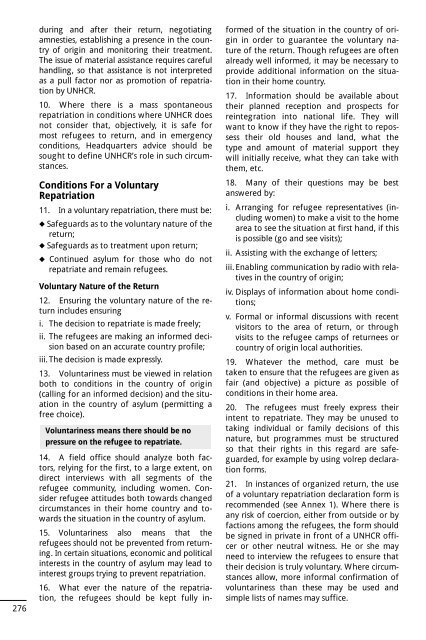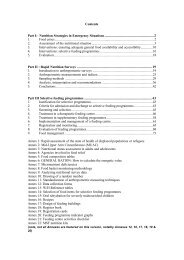UNHCR Handbook for Emergencies - UNHCR eCentre
UNHCR Handbook for Emergencies - UNHCR eCentre
UNHCR Handbook for Emergencies - UNHCR eCentre
Create successful ePaper yourself
Turn your PDF publications into a flip-book with our unique Google optimized e-Paper software.
276<br />
during and after their return, negotiating<br />
amnesties, establishing a presence in the country<br />
of origin and monitoring their treatment.<br />
The issue of material assistance requires careful<br />
handling, so that assistance is not interpreted<br />
as a pull factor nor as promotion of repatriation<br />
by <strong>UNHCR</strong>.<br />
10. Where there is a mass spontaneous<br />
repatriation in conditions where <strong>UNHCR</strong> does<br />
not consider that, objectively, it is safe <strong>for</strong><br />
most refugees to return, and in emergency<br />
conditions, Headquarters advice should be<br />
sought to define <strong>UNHCR</strong>’s role in such circumstances.<br />
Conditions For a Voluntary<br />
Repatriation<br />
11. In a voluntary repatriation, there must be:<br />
◆ Safeguards as to the voluntary nature of the<br />
return;<br />
◆ Safeguards as to treatment upon return;<br />
◆ Continued asylum <strong>for</strong> those who do not<br />
repatriate and remain refugees.<br />
Voluntary Nature of the Return<br />
12. Ensuring the voluntary nature of the return<br />
includes ensuring<br />
i. The decision to repatriate is made freely;<br />
ii. The refugees are making an in<strong>for</strong>med decision<br />
based on an accurate country profile;<br />
iii. The decision is made expressly.<br />
13. Voluntariness must be viewed in relation<br />
both to conditions in the country of origin<br />
(calling <strong>for</strong> an in<strong>for</strong>med decision) and the situation<br />
in the country of asylum (permitting a<br />
free choice).<br />
Voluntariness means there should be no<br />
pressure on the refugee to repatriate.<br />
14. A field office should analyze both factors,<br />
relying <strong>for</strong> the first, to a large extent, on<br />
direct interviews with all segments of the<br />
refugee community, including women. Consider<br />
refugee attitudes both towards changed<br />
circumstances in their home country and towards<br />
the situation in the country of asylum.<br />
15. Voluntariness also means that the<br />
refugees should not be prevented from returning.<br />
In certain situations, economic and political<br />
interests in the country of asylum may lead to<br />
interest groups trying to prevent repatriation.<br />
16. What ever the nature of the repatriation,<br />
the refugees should be kept fully in-<br />
<strong>for</strong>med of the situation in the country of origin<br />
in order to guarantee the voluntary nature<br />
of the return. Though refugees are often<br />
already well in<strong>for</strong>med, it may be necessary to<br />
provide additional in<strong>for</strong>mation on the situation<br />
in their home country.<br />
17. In<strong>for</strong>mation should be available about<br />
their planned reception and prospects <strong>for</strong><br />
reintegration into national life. They will<br />
want to know if they have the right to repossess<br />
their old houses and land, what the<br />
type and amount of material support they<br />
will initially receive, what they can take with<br />
them, etc.<br />
18. Many of their questions may be best<br />
answered by:<br />
i. Arranging <strong>for</strong> refugee representatives (including<br />
women) to make a visit to the home<br />
area to see the situation at first hand, if this<br />
is possible (go and see visits);<br />
ii. Assisting with the exchange of letters;<br />
iii. Enabling communication by radio with relatives<br />
in the country of origin;<br />
iv. Displays of in<strong>for</strong>mation about home conditions;<br />
v. Formal or in<strong>for</strong>mal discussions with recent<br />
visitors to the area of return, or through<br />
visits to the refugee camps of returnees or<br />
country of origin local authorities.<br />
19. Whatever the method, care must be<br />
taken to ensure that the refugees are given as<br />
fair (and objective) a picture as possible of<br />
conditions in their home area.<br />
20. The refugees must freely express their<br />
intent to repatriate. They may be unused to<br />
taking individual or family decisions of this<br />
nature, but programmes must be structured<br />
so that their rights in this regard are safeguarded,<br />
<strong>for</strong> example by using volrep declaration<br />
<strong>for</strong>ms.<br />
21. In instances of organized return, the use<br />
of a voluntary repatriation declaration <strong>for</strong>m is<br />
recommended (see Annex 1). Where there is<br />
any risk of coercion, either from outside or by<br />
factions among the refugees, the <strong>for</strong>m should<br />
be signed in private in front of a <strong>UNHCR</strong> officer<br />
or other neutral witness. He or she may<br />
need to interview the refugees to ensure that<br />
their decision is truly voluntary. Where circumstances<br />
allow, more in<strong>for</strong>mal confirmation of<br />
voluntariness than these may be used and<br />
simple lists of names may suffice.



